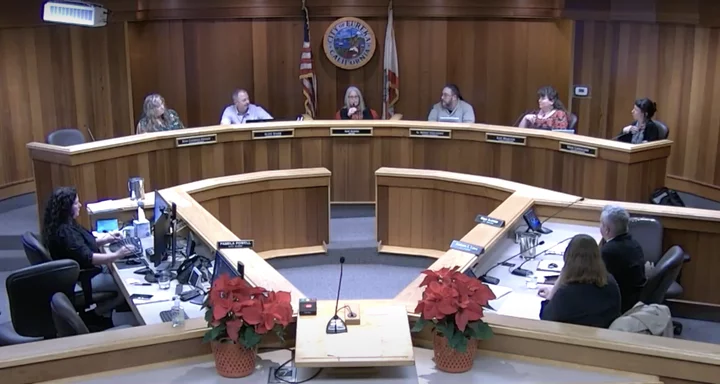Screenshot of Tuesday’s Eureka Council meeting.
###
Many residents living along Myrtle Avenue will be relieved to learn that the City of Eureka has abandoned a proposal to remove street parking between West and Harrison Avenues to allow for the construction of buffered bike lanes along the thoroughfare. During last night’s meeting, the Eureka City Council agreed to scrap the proposal in response to significant opposition from the public.
The city has planned some improvements along Myrtle Avenue, including water main replacement and pavement maintenance, sometime in the next year. With all of that construction going on, staff thought it would be a good opportunity to advance some of the concepts outlined in the city’s Complete and Green Streets Policy and expand the existing bike lanes into buffered bike lanes to increase safety for cyclists.
The city conducted a parking study along Myrtle Avenue from East Avenue to Sunny Avenue and Sunny Avenue to McFarlan Street to get a better idea of how many parking spaces are occupied at different times of the day. At most, only 17 percent of the parking spaces were in use at a given time, according to the study.
“Generally low occupancy [in the area],” City Engineer Jesse Willor said during last night’s meeting. “With the low utilization of parking of parking in the area, that’s one of the things that kind of brought this as an option. But it is only an option.”
The city council heard from about a dozen folks during last night’s meeting, all of whom expressed their strong opposition to the proposed project.
David Hillegeist, a self-proclaimed avid cyclist, said he has cycled along Myrtle Avenue nearly every day for the last 30 years. He said the existing bike path “works as long as they keep the white line white,” and asked the council to reject the proposal.
“I have two spaces [at my house] – one is [for] my truck and the other one is for [a] guest and there’s only room for one guest at a time,” he said. “If parking on Myrtle [Avenue] were discontinued, the guests and the service vehicles – we’re talking FedEx and UPS – they would be forced to go looking for another place to park. The nearest parking that I can find is either on 15th Street to the south or Bay Street to the west. Both of those are two blocks away from my single parking space, and I’m certain that you would agree that it really doesn’t make much sense.”
Another commenter, Scott Willits, said he was shocked that the city’s Transportation Safety Commission had agreed to forward the item to the city council despite rampant opposition from the public.
“I’ve yet to speak to a single cyclist who thinks that this is a good idea, who thinks that this is more important than parking,” he added. “I just can’t see any way – in my calculations – that if you do the cost-benefit analysis the benefits to the cycling community would outweigh the harm that is being done to those of us who own homes and live in apartments along this stretch of road who are ultimately gonna pay the price for this.”
A commenter who only identified herself as Patty said she developed her own survey to gauge interest in expanding bicycle facilities on Myrtle Avenue.
“We have 339 responses,” she said. “I’m only gonna give you two questions that we asked … but I think this speaks volumes. The question is: Do you ride a bike as a primary form of transportation? 329 people responded ‘no’ and 10 people responded ‘yes’. That is 97.1 percent of people in Eureka saying they don’t ride bikes as a primary transportation. Next question: Would you consider riding a bike as a primary form of transportation in Eureka? … 90.9 percent responded ‘no’.”
Following public comment, Councilmember Scott Bauer noted that city staff are looking for creative ways to implement the city’s Complete Streets Policy where it makes sense. “It’s something we’re trying to do, not something we’re going to do.” He added that he would have a hard time supporting the proposal after hearing public feedback.
Councilmember Leslie Castellano agreed, adding, “I appreciate this exercise of democracy.”
Councilmembers Renee Contreras-DeLoach and G. Mario Fernandez asked if the city could construct other barriers to keep cyclists safe. Willor said staff would be willing to look into additional safety barriers, but it would depend on cost.
After a bit of additional discussion, the council agreed to nix the proposal without a formal vote.

CLICK TO MANAGE